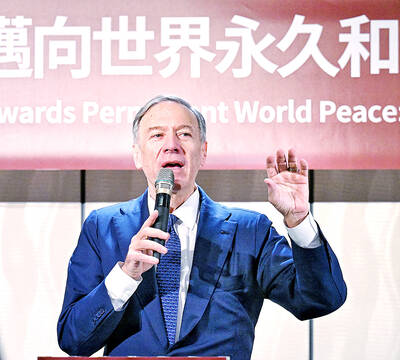The World Bank yesterday estimated economic growth in developing countries at 1.2 percent this year and said that without China and India, output would have shrunk 1.6 percent.
Amid the worst global financial and economic crisis in seven decades, the multilateral institution eight days ago lowered its outlook on global growth to a contraction of 3 percent this year.
It slightly revised the global GDP figure to a 2.9 percent decline.
The development lender’s preceding forecast, published in late March, put developing countries’ annual growth at 2.1 percent, and at zero if China and India were excluded.
Next year, global growth was projected at 2 percent and that of the developing countries at 4.4 percent, the bank said. Excluding China and India, the developing countries would grow 2.5 percent.
China’s economy was forecast to expand 7.2 percent this year and 7.7 percent next year, while India’s forecast was for 5.1 percent followed by 8 percent.
The latest World Bank forecasts on GDP — a measure of goods and services output in a country — came in a report Global Development Finance 2009: Charting a Global Recovery, published to coincide with a three-day Annual Bank Conference on Development Economics opening yesterday in Seoul.
The World Bank expressed concern about the thinning flow of private capital into developing countries, which has fallen nearly by half this year — 49 percent — to US$363 billion, compared with US$707 billion last year, after a record US$1.2 trillion in 2007.
The development lender also projected a 9.7 percent decline in global trade volume this year, before a 3.8 percent growth rebound next year.
“The need to restructure the banking system, combined with emerging limits to expansionary policies in high-income countries, will prevent a global rebound from gaining traction,” World Bank chief economist Justin Lin (林毅夫) said in a statement.
The anti-poverty bank called for “special attention” to “the risk of balance-of-payments crises and corporate debt restructurings in many countries” to “avoid another debt crisis as seen in the 1970s and 1980s.”
That was particularly the case in hard-hit developing countries in Europe and Central Asia, where GDP was projected to fall 4.7 percent this year, before a slight recovery to 1.6 percent growth next year.The World Bank yesterday estimated economic growth in developing countries at 1.2 percent this year and said that without China and India, output would have shrunk 1.6 percent.
Amid the worst global financial and economic crisis in seven decades, the multilateral institution eight days ago lowered its outlook on global growth to a contraction of 3 percent this year.
It slightly revised the global GDP figure to a 2.9 percent decline.
The development lender’s preceding forecast, published in late March, put developing countries’ annual growth at 2.1 percent, and at zero if China and India were excluded.
Next year, global growth was projected at 2 percent and that of the developing countries at 4.4 percent, the bank said. Excluding China and India, the developing countries would grow 2.5 percent.
China’s economy was forecast to expand 7.2 percent this year and 7.7 percent next year, while India’s forecast was for 5.1 percent followed by 8 percent.
The latest World Bank forecasts on GDP — a measure of goods and services output in a country — came in a report Global Development Finance 2009: Charting a Global Recovery, published to coincide with a three-day Annual Bank Conference on Development Economics opening yesterday in Seoul.
The World Bank expressed concern about the thinning flow of private capital into developing countries, which has fallen nearly by half this year — 49 percent — to US$363 billion, compared with US$707 billion last year, after a record US$1.2 trillion in 2007.
The development lender also projected a 9.7 percent decline in global trade volume this year, before a 3.8 percent growth rebound next year.
“The need to restructure the banking system, combined with emerging limits to expansionary policies in high-income countries, will prevent a global rebound from gaining traction,” World Bank chief economist Justin Lin (林毅夫) said in a statement.
The anti-poverty bank called for “special attention” to “the risk of balance-of-payments crises and corporate debt restructurings in many countries” to “avoid another debt crisis as seen in the 1970s and 1980s.”
That was particularly the case in hard-hit developing countries in Europe and Central Asia, where GDP was projected to fall 4.7 percent this year, before a slight recovery to 1.6 percent growth next year.

ANNOUNCEMENT: People who do not comply with the ban after a spoken warning would be reported to the police, the airport company said on Friday Taoyuan International Airport Corp on Friday announced that riding on vehicles, including scooter-suitcases (also known as “scootcases”), bicycles, scooters and skateboards, is prohibited in the airport’s terminals. Those using such vehicles should manually pull them or place them on luggage trolleys, the company said in a Facebook post. The ban intends to maintain order and protect travelers’ safety, as the airport often sees large crowds of people, it said, adding that it has stepped up publicity for the regulation, and those who do not comply after a spoken warning would be reported to the police. The company yesterday said that

NEW YEAR’S ADDRESS: ‘No matter what threats and challenges Taiwan faces, democracy is the only path,’ William Lai said, urging progress ‘without looking back’ President William Lai (賴清德) yesterday urged parties across the political divide to democratically resolve conflicts that have plagued domestic politics within Taiwan’s constitutional system. In his first New Year’s Day address since becoming president on May 20 last year, Lai touched on several issues, including economic and security challenges, but a key emphasis was on the partisan wrangling that has characterized his first seven months in office. Taiwan has transformed from authoritarianism into today’s democracy and that democracy is the future, Lai said. “No matter what threats and challenges Taiwan faces, democracy is the only path for Taiwan,” he said. “The only choice

QUIET START: Nearly a week after applications opened, agencies did not announce or promote the program, nor did they explain how it differed from other visitor visas Taiwan has launched a six-month “digital nomad visitor visa” program for foreign nationals from its list of visa-exempt countries who meet financial eligibility criteria and provide proof of work contracts. To apply, foreign nationals must either provide proof that they have obtained a digital nomad visa issued by another country or demonstrate earnings based on age brackets, the Bureau of Consular Affairs said. Applicants aged 20 to 29 must show they earned an annual salary of at least US$20,000 or its equivalent in one of the past two years, while those aged 30 or older must provide proof they earned US$40,000 in

UNITY MESSAGE: Rather than focusing on what Trump said on the campaign trail about Taiwan, Taipei should be willing to engage with the US, Pompeo said Taiwan plays a key role in Washington’s model of deterrence against China, former US secretary of state Mike Pompeo said in a speech in Taipei yesterday. During US president-elect Donald Trump’s first term, “we had developed what we believe was a pretty effective model of deterrence against adversaries who wanted to undermine the set of rules and values that the people of Taiwan and the people of the US hold dear,” Pompeo said at a forum organized by the Formosa Republican Association. “Succeeding in continuing to build this model will not solely rest at the feet of president Trump and his team,